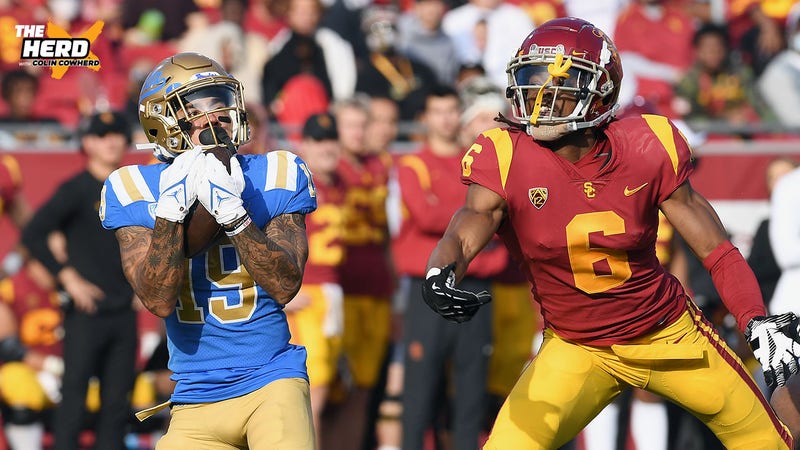Reactions continue to pour in over the latest bombshell news that USC and UCLA — the two biggest college brands on the West Coast — are leaving the Pac-12 for the Big Ten in 2024.
The expansion has left many thinking that college football is headed toward a pro model with two mega-conferences. It’s a win for other schools in the Big Ten that feel USC and UCLA can help “carry some weight,” while it’s a blow for a Pac-12 Conference that hasn’t sent a team to the College Football Playoff since 2016.
On Monday’s “The Herd,” Colin Cowherd broke down what USC and UCLA’s move to the Big Ten means for college football and why it doesn’t come as a shock, considering recent moves from other schools.
“I was not surprised [that] USC joined the Big Ten. I was surprised UCLA went for it,” Cowherd said. “USC has been unhappy for years. The Pac-12 does not create the revenue they need. When they got Lincoln Riley, they sold him on, ‘Big things are happening.’ … They’ve thought about going independent. … They felt they were treated no better than Washington State … and USC and UCLA are almost half the TV revenue for the conference.”
What USC and UCLA’s move to Big Ten means for college football
Colin Cowherd reacts to the decision and discusses how this conference alignment affects the future of college football.
“Here [are] five questions I hear,” Cowherd continued. “‘What about the Pac-12?’ Well, it was dead five years ago. That’s somebody else’s problem. ‘[What about] Big Ten football … at other schools?’ I’ve been told Notre Dame, they would add. They’re not interested in anybody beyond that. Notre Dame adds the kind of value — financial value — that would be worth splitting the pot a little more. ‘What about all the travel?’ Well, it’s bad for Olympic sports, but it’s pretty easy for football. USC and UCLA will play their out-of-conference games to start the season in September at home, and then they’ll have their 10 conference games — five on the road, maybe an occasional back-to-back.
“I also hear this, ‘What about the weather?’ Time out. … They’ll be able to handle a 42-degree day with a little wind. “I also hear this, ‘Lincoln Riley must be upset!’ No, when they pitched him on coming to USC they said, ‘We’re having the Olympics in this city. We have Super Bowls in this city. Be aware that we’re going to take moon shots here. We’re going big.’
“Folks, once Texas [and] Oklahoma decided to go to the SEC, what’re you gonna sit around and do if you’re the Big Ten or USC? USC is a top-seven, -six, -five, -four brand of all time. What’re you gonna do? … Seven years of attendance and ratings declines. College football has a big-game problem. … College football is a litany of ugly, unwatchable, blowout, uneven games. USC and UCLA to the Big Ten solves a lot of that problem. What’s it gonna look like in 10 years? Who knows and who cares? College football has got a today problem. … It was a no-brainer for both the Bruins and the Trojans.”
USC is coming off a 4-8 season under the new hire of head coach Riley, while UCLA finished 8-4 last season.
The Pac-12 brought in just $341 million in revenue last year and distributed only $19.8 million per school in the fiscal 2021 year, which was by far the least among Power 5 conferences (a fleeting idea these days). The Big Ten divvied up $680 million to its member schools in the same fiscal year.
With the additions of USC and UCLA, the Big Ten increases its membership to 16 teams. The SEC will also increase its membership to 16 by 2025 after voting last year to allow Oklahoma and Texas to join.

Get more from College Football Follow your favorites to get information about games, news and more.

